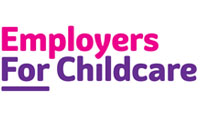Your guide to financial support and employment rights for new and expectant parents
Pregnancy and parental leave – while exciting and joyful – can be an anxious time for parents, and money worries can contribute to this. However, there are many different benefits and entitlements available depending on your personal circumstances. We know it can be complex working out what support you are entitled to, and what is best for your family, at what is already a busy, sometimes stressful time with the arrival of a new baby.
This article is designed to give you an overview of the support available and signpost you to further information, but remember – our team is also here for a chat! If you would like to discuss what support is available, simply email your details to hello@employersforchildcare.org and we will call you back, or you can call Freephone 0800 028 3008.
You will also find lots more detail in our information factsheets available here.
Healthy Start Scheme
The Healthy Start Scheme provides free tokens to assist with the purchase of milk, vegetables, infant formula and vitamins. To be eligible you must be at least 10 weeks pregnant, or have a child in the household under the age of four, and be in receipt of a qualifying benefit. Alternatively, if you are under 18 and pregnant, you are entitled to the scheme even if you are not claiming any benefits. For further information visit nidirect.gov.uk/articles/free-milk-fruit-vegetables-and-vitamins
Paid time off for antenatal care
If you are pregnant and are currently employed you have a right to paid time off to attend your antenatal appointments. This time off is in addition to your annual leave entitlement and is regardless of length of service. Your partner or the child’s father is entitled to unpaid time off work to attend up to two antenatal appointments.
Statutory Maternity Leave and Pay (SMP)
Maternity leave, which guarantees the right to return to work, is only available to employees. Other workers (for example, agency workers) have no automatic right to return to a job. Employees are entitled to take up to 52 weeks’ (one year) maternity leave.
If you are working and pregnant, you may be entitled to Statutory Maternity Pay (SMP). To qualify for SMP you must have been with your current employer for at least 26 weeks and have average earnings of at least £120 per week. SMP is ordinarily paid for the first 39 weeks of your 52 week maternity leave entitlement.
| Statutory Maternity Leave | Statutory Maternity Pay (2021/2022) |
| The first six weeks | 90% of your average weekly earnings before tax |
| The next 33 weeks | £151.97 or 90% of your average weekly earnings – whichever is less |
| The next 13 weeks (if taken) | Unpaid |
Some employers offer an enhanced package of Contractual Maternity Pay, which exceeds the statutory entitlement. Check your contract of employment to determine if this applies in your case.
If eligible for SMP you will need to tell your employer when you intend to stop working at least 15 weeks before baby is due, you will also need to give your employer at least 28 days advance notice regarding when you would like your SMP to begin.
Maternity Allowance (MA)
If you are working or have been in recent employment, but are not entitled to SMP, you might be entitled to Maternity Allowance (MA). To qualify for MA, you must have been:
- Employed or self-employed for at least 26 weeks of the 66 weeks before your baby’s due date and
- Earning £30 a week or more for at least 13 weeks – the weeks do not have to be together.
You may still qualify if you’ve recently stopped working. It does not matter if you had different jobs or period of unemployment. Maternity Allowance is paid at a rate of £151.97 per week, or 90% of your average pay (whichever is lower) for 39 weeks.
If you usually earn £30 or more a week and only earned less in some weeks because you were on furlough under the Coronavirus Job Retention Scheme you may still be eligible.
Statutory Paternity Leave and Pay
If your partner is pregnant, adopting a child or having a baby through a surrogate, you may be eligible for Statutory Paternity Leave of up to two weeks provided you are an employee who has worked continuously for the same employer for at least 26 weeks and have average earnings of at least £120 per week by the end of the 15th week before the baby is due.
You could also qualify for Statutory Paternity Pay of £151.97 per week or 90% of your average weekly earnings if this is less. Some employers offer more generous paternity packages. This should be outlined in your contract of employment. To quality for Statutory Paternity Pay you must have average weekly earnings above the lower earnings limit for National Insurance purposes, £120 per week.
Shared Parental Leave and Pay
If you have a baby (including through a surrogacy arrangement, where you are a ‘Parental Order Parent’) or adopt a child, you and your partner might be entitled to Shared Parental Leave (SPL) during your child’s first year. Parents and adopters might also be eligible for Shared Parental Pay (ShPP). Shared Parental Leave means that you and your partner could choose to be at home together, or to work at different times, and share the care of your baby during their first year.
To qualify, you must:
- have been employed continuously for at least 26 weeks by the end of the 15th week before the due date (or by the date you are matched with your adopted child), and
- be employed by the same employer while you take SPL.
During the 66 weeks before the baby is due your partner must:
- have been working for at least 26 weeks (these weeks do not need to be consecutive)
- have earned at least £30 a week on average in 13 of the 66 weeks
- be employed, self-employed or an agency worker.
Both parents must meet the eligibility conditions to be able to get SPL and ShPP. If only one qualifies then you cannot share the leave.
ShPP is paid at the rate of £151.97 a week or 90% of your average weekly earnings, whichever is lower. This is the same as Statutory Maternity Pay ( SMP ) except that during the first 6 weeks SMP is paid at 90% of whatever you earn (with no maximum).
Statutory Adoption Leave and Pay
If you are adopting as a couple, or a couple who are Parental Order Parents (i.e. becoming a parent through a surrogacy arrangement), you may be entitled to Statutory Adoption Leave and Pay. Note that only one of you can take adoption leave, however a partner may qualify for statutory paternity leave and pay. The person who qualifies for Statutory Adoption Leave may also qualify for Statutory Adoption Pay. You don’t qualify for Statutory Adoption Leave or Pay if you:
- arrange a private adoption
- become a special guardian
- adopt a stepchild.
Sure Start Maternity Grant (SSMG)
In most cases the SSMG is a one-off, tax-free payment of £500 to help towards costs associated with maternity and the birth of your first baby. Note that in Scotland, the equivalent is the Pregnancy and Baby Payment.
To be eligible for the grant you must be on a qualifying benefit. This includes Universal Credit, however your application will only be recognised once you have received your first Universal Credit payment.
Tax Credits and Universal Credit
For those in receipt of Tax Credits or Universal Credit, having a baby may increase the amount of benefit payable. Note that neither Tax Credits nor Universal Credit take children born after 5th April 2017 into account if there are already two children in the household (some exceptions apply).
Child Benefit
Child Benefit is a tax-free payment made to those who are responsible for a child or qualifying young person. You can claim Child Benefit regardless of your income however, if you or your partner’s individual income is over £50,000 you may have to pay extra tax. If you are liable for this tax charge you can choose not to get Child Benefit payments, but you should still fill in the claim form as this will help you get National Insurance Credits which count towards your State Pension. This will also ensure your child is registered to get a National Insurance number when they are 16 years old.
There are two rates:
- Child Benefit for the eldest or only child is currently £21.15 per week.
- Child Benefit for additional children is currently £14.00 per child per week.
It’s important to understand your parental rights
Our Family Benefits Advice Service can also provide advice on your employment entitlements and workplace legislation. It is important to note that furlough may also add an additional layer of complexity and if you have been or are currently furloughed and are planning to take parental or adoption leave, you are entitled to pay based on your usual earnings rather than your furloughed pay rate. If you are unsure our specialist team can help provide free, impartial and confidential advice.
Once your child is born, you may also be entitled to the following:
- Support with childcare costs for working parents
- Childcare Grant for full-time students
- Parental leave
Call our team today on 028 9267 8200 or email hello@employersforchildcare.org






